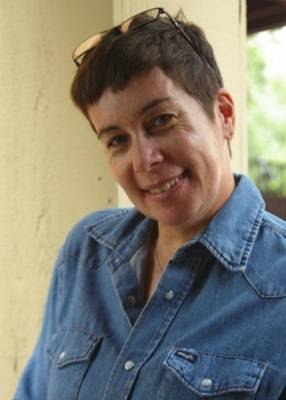
M. M. Adjarian
Sprints
M. M. Adjarian is a writer and professor. She has published creative work in The Provo Canyon Review, The Milo Review, From the Depths, and Empty Sink Publishing. Her articles and reviews have also appeared in Arts+Culture Texas, Bitch Magazine, Kirkus, and the Dallas Voice, as well as in several academic journals and compendiums. Currently, she is working on a family memoir titled The Beautiful Dreamers. She lives in Austin.
Birdman
I was five years old when my father revealed that he had once been a birdman. In 1945 and just before Hitler’s defeat, my high-flying father had joined the French Army to train as a paratrooper. His missions took him to North Africa where he jumped out of airplanes and sailed over the deserts of Morocco on wings of silk and rope. He showed me a bronze-colored medal with a star emblazoned on a parachute.
“Look at this,” he said proudly.
I wasn’t satisfied.
“I want to see how you flew out of the sky,” I told him.
My father did, but not in the way I expected. One afternoon he beckoned me into the toolshed next to the corrugated metal building where he did the rare book restoration work that absorbed him during the day. He dug through tin coffee cans filled with metal odds and ends and poked in dusty corners until he found what he was looking for: a rusty iron ring that fit in the palm of his hand, four pieces of string, and a stained cleaning cloth that he cut into a neat, handkerchief-sized square.
He set to work. With slender hands—so like my own but made muscular, calloused and sure by years of moving, lifting and repairing heavy old books—my father wound and tied one piece of string around each of the four corners of the cloth. When that was done, he carefully attached each end of the string to the ring. What he made seemed so clumsy and makeshift. To me, he was nothing but a crazy foreigner with strange ideas. Why make do with what you had when you could maybe buy a parachute toy with a real little soldier attached to it?
When he finished, we walked together into the exuberant overgrowth of our Southern California backyard. My father wound the strings and cloth around the ring. In one swift, fluid motion, he raised his arm, flicked his wrist, and tossed the toy into the air. To my surprise, the parachute puffed opened and the iron ring paratrooper floated back to earth with the easy grace of a butterfly.
I chased after it, amazed that what my father had made actually worked. I threw the toy into the air several times after that, learning how to roll the string and cloth just right so that it flew and fell as lightly as it had the first time it left its maker’s hand. My father in the meantime looked on in silence. His normally smooth brow contracted like an accordion into furrows that ran the length of his forehead. He seemed sad and I didn’t know why. What he made had not only triumphed over gravity but all my doubts as well.
Leaving the backyard with my father, I soared higher than I’d thrown my toy. Now I had my very own birdman and I would play with it forever. But the iron ring paratrooper and his cleaning cloth parachute disappeared the next day. Still, the memory remains. That ugly and ungainly toy had me feel close to its maker, the kind but at times sullen man with a last name that did not suit his blue eyes and fair skin, and who spoke with an accent that untrained ears mistook for British.
Another memory remains. Early one morning a few weeks later, my mother rousted me out of bed. My older brother hovering beside her, she dragged me, still in my pyjamas and still rubbing the sleep out of my eyes, to where my father’s station wagon stood idling at the bottom of the driveway. “Max!” my mother cried as she pushed me toward my father, who had climbed out from behind the steering wheel. His face was closed to me, an unreadable blur. Stumbling into the empty space between us, I felt my heart pound in fear.
My father did not go.
Somehow, my mother had found out her ex-birdman husband’s intentions to leave the country. And on a day that should have been like any other but was really the beginning of the end of our life together, I had become a tether, the one thing that had kept my father from flying free of a marriage and family that had become heavier than the earth itself.
